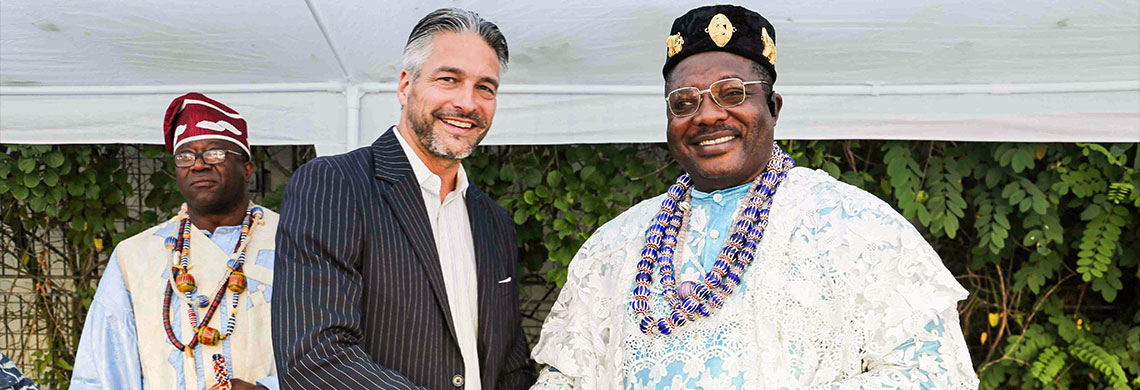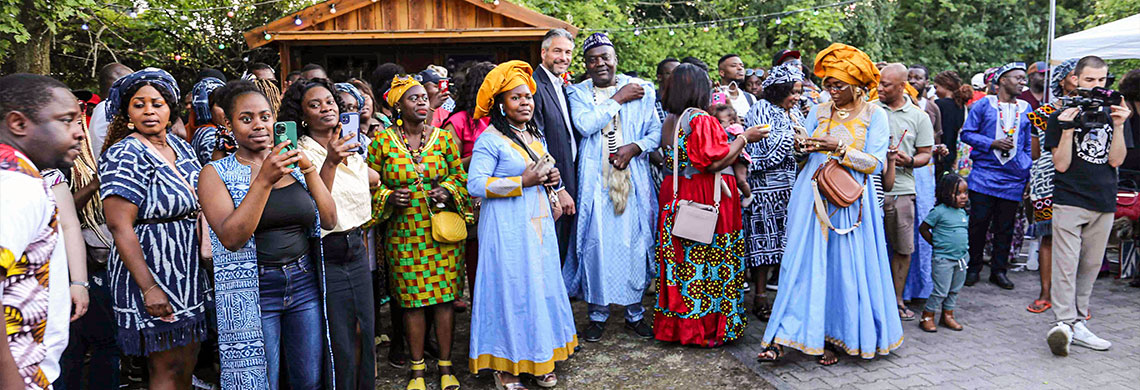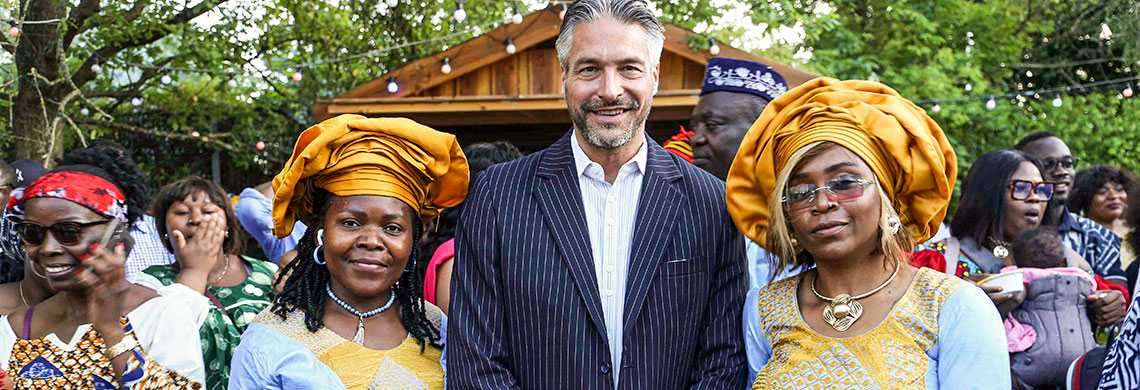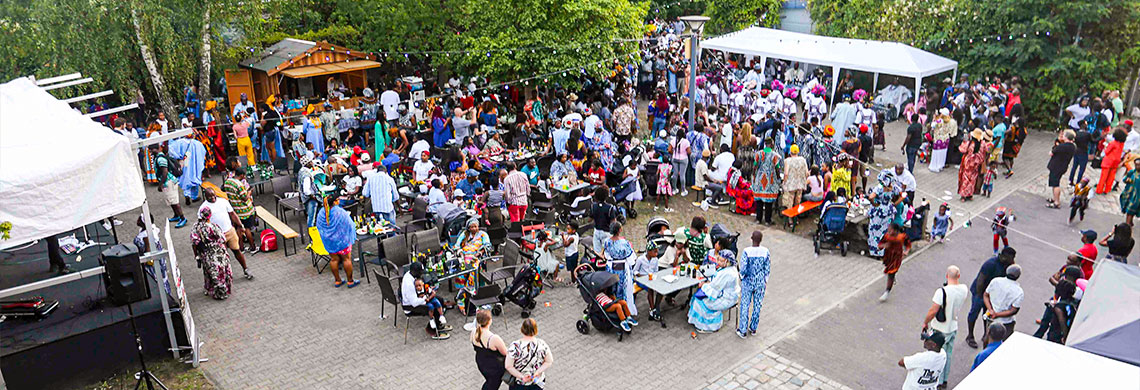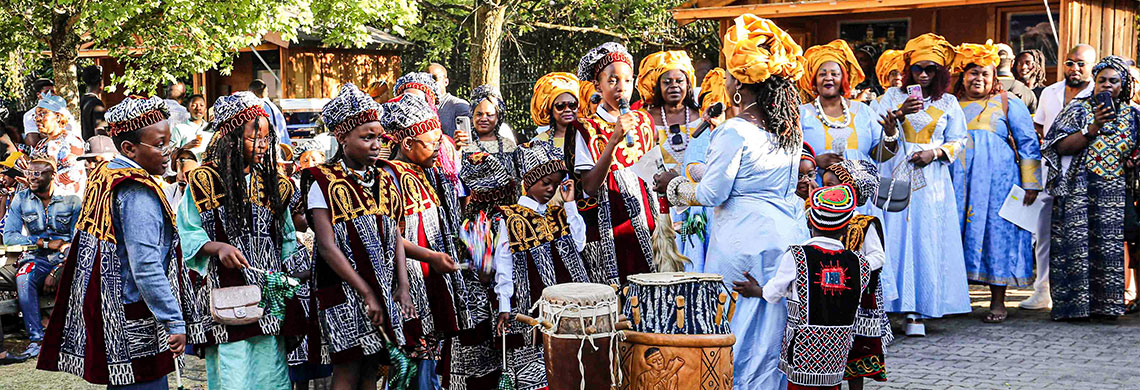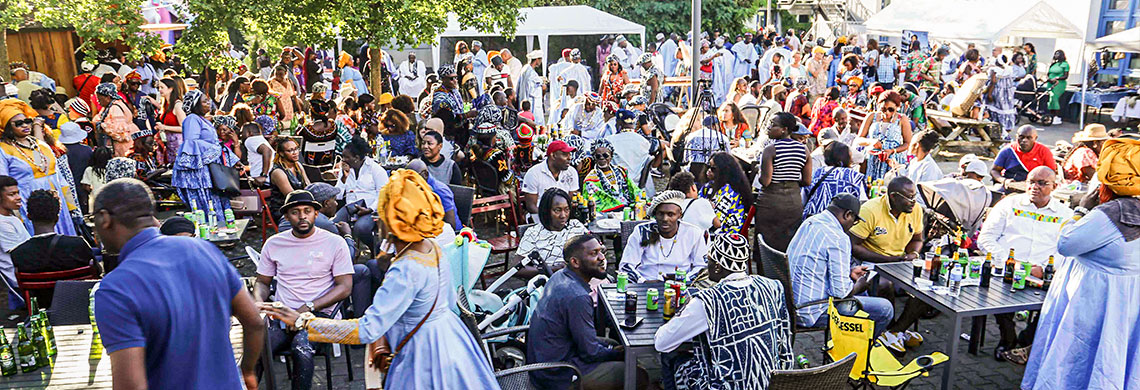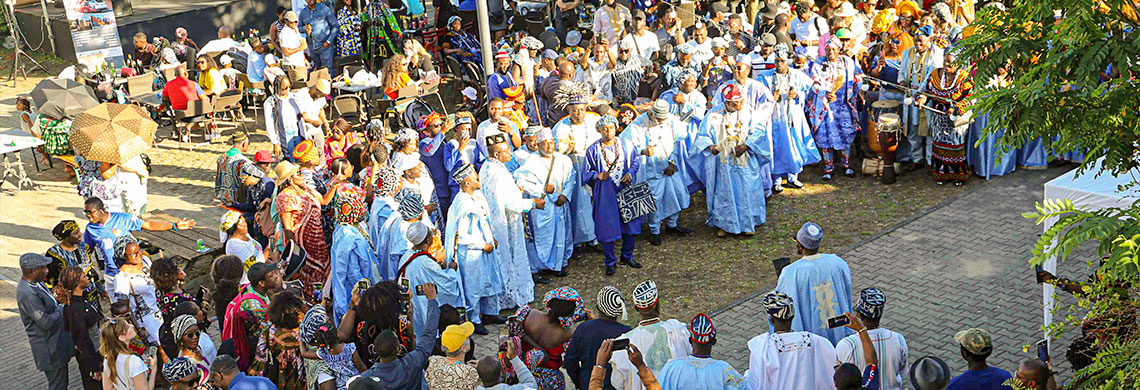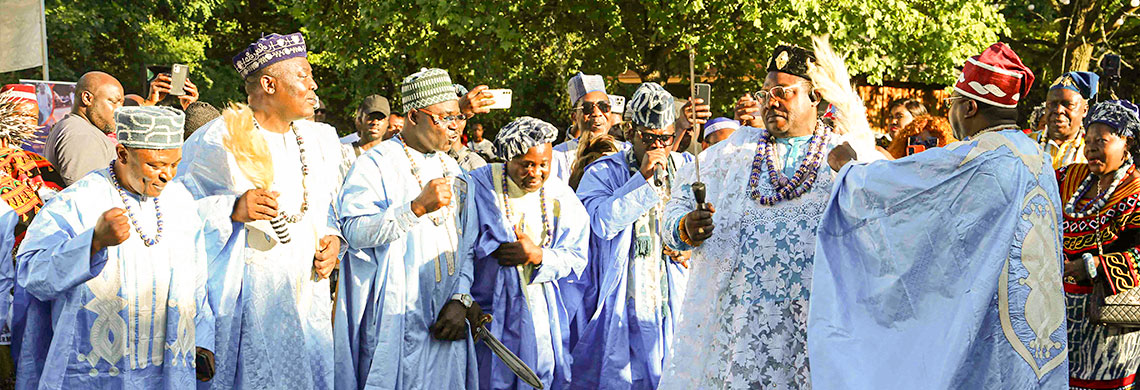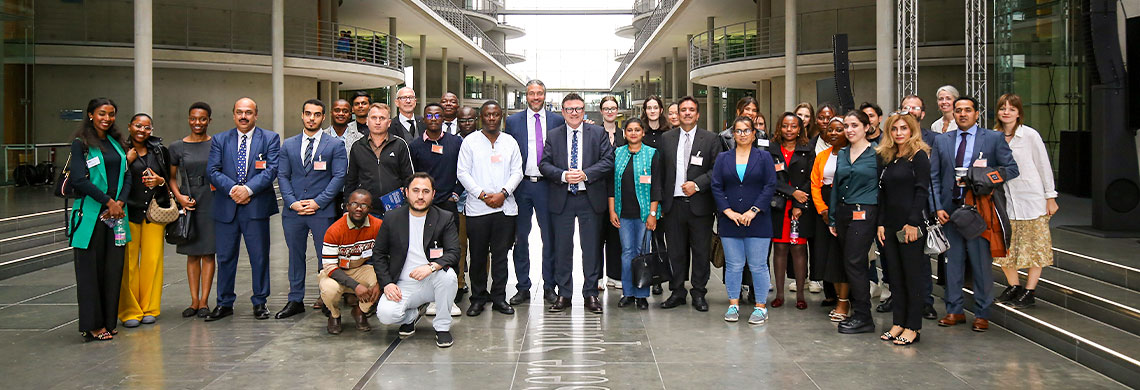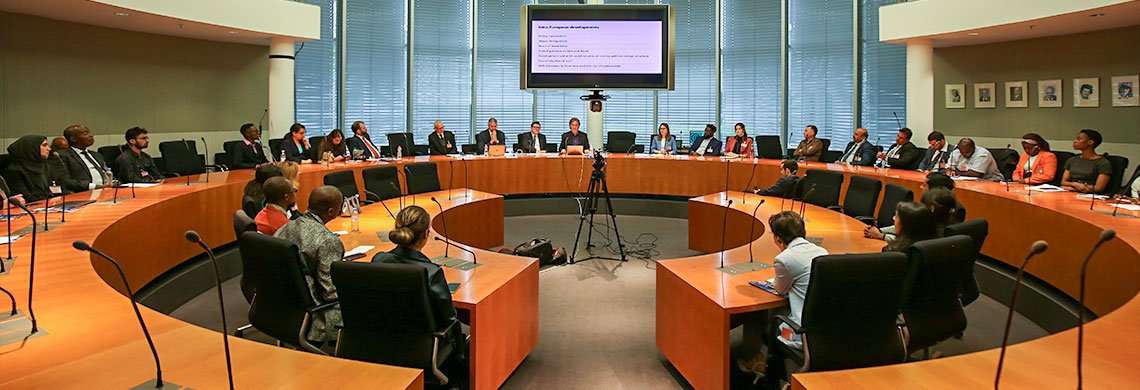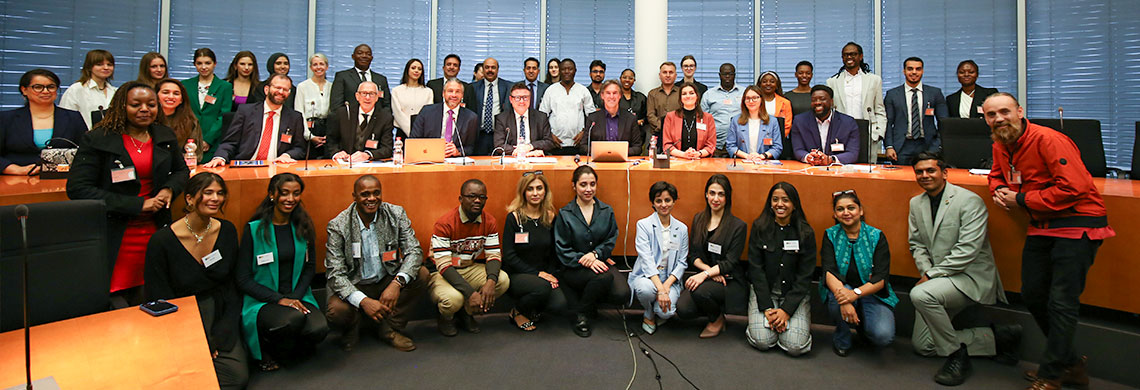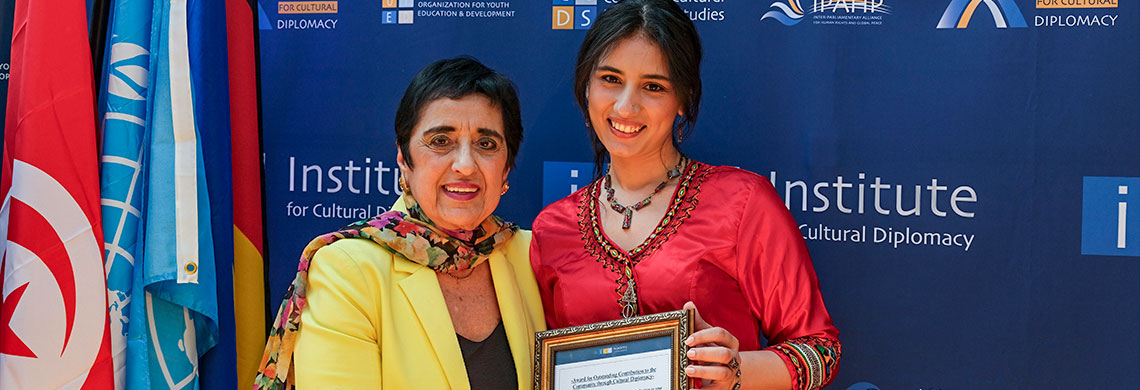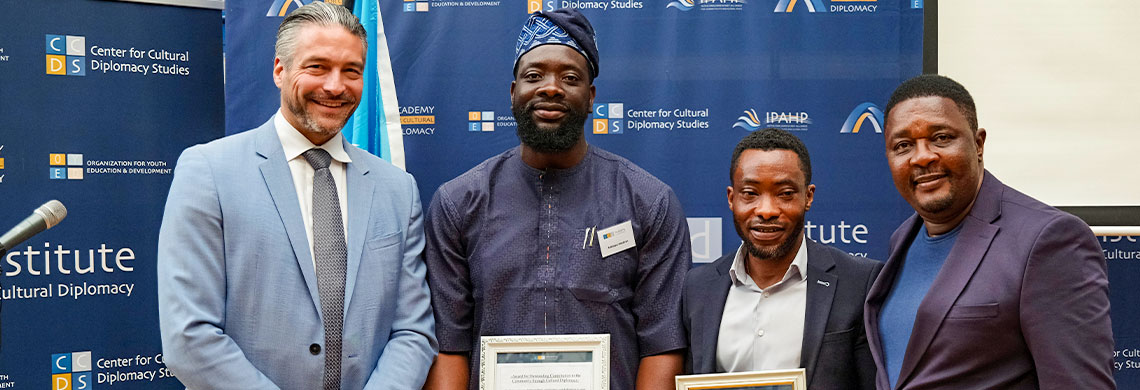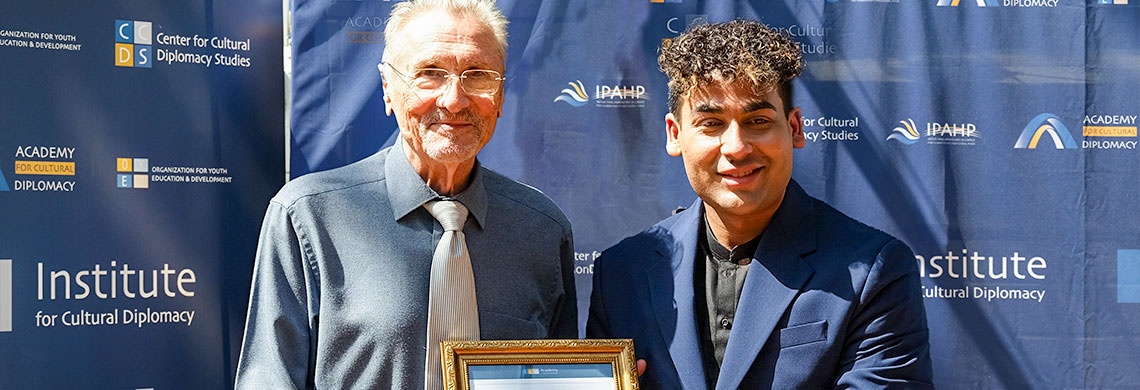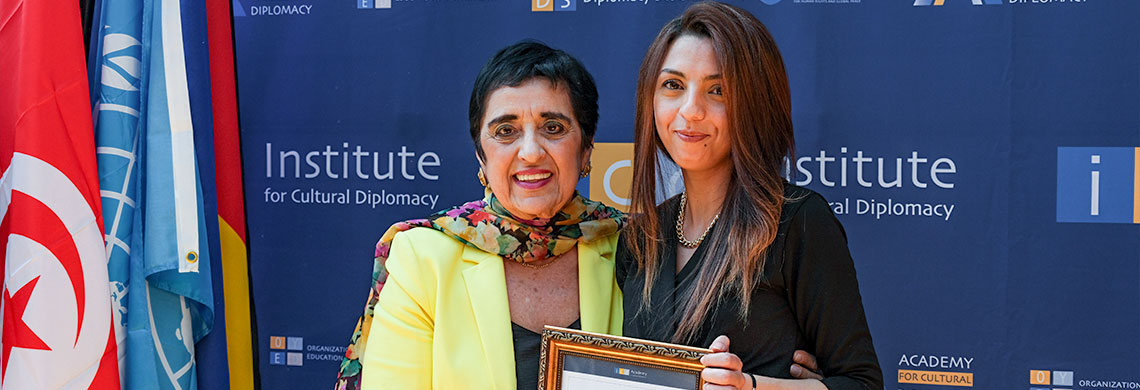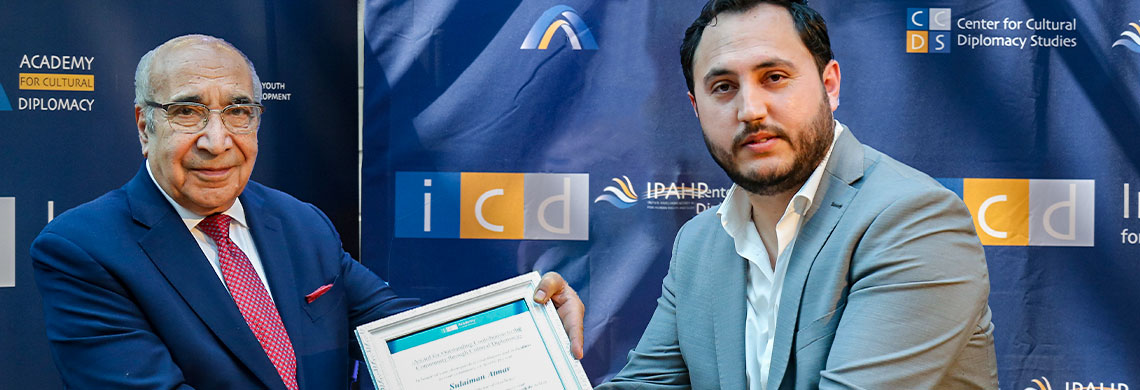Young Leaders´ Forums
The UK Meets Germany
 Day 1: Deutsche Welle, the German Parliament, and an Introduction to Cultural Diplomacy
Day 1: Deutsche Welle, the German Parliament, and an Introduction to Cultural DiplomacyDay 2: An introduction to Berlin, the Berlin Philharmonic, and Dr. von Moltke
Day 3: The big debate, Dr. Sigrid Newman, and the Foreign Office
Day 4: The British Council and the British Minister of State for Europe
Day 5: Dr. Gerhard Leitner, Dr. Roderick Parkes, and the program close
Day 1 -14 December 2009
Deutsche WelleDay 2 – 15 December 2009
The fourth Weeklong Seminar for the Institute for Cultural Diplomacy’s program “The UK Meets Germany: A Forum for Young Leaders“ began with a welcome by UKMG Program Director Mr. Peter Rees, who spoke to the participants about why the program was created, what would be taking place during the week, and what was expected of them as Young Leaders. Mr. Rees’s introduction was followed by a speech delivered by Deutsche Welle TV Political Moderator Peter Craven, who was born and raised in the UK but has spent the last two decades in Germany and has recently become a dual national. The seminar with Mr. Craven covered a wide range of topics including the different media cultures in the UK and Germany and the challenges that immigrants in Germany face in being seen as “German”.
German Parliament
Following lunch in a nearby Italian restaurant, the participants headed in to the centre of Berlin for a session with an MP, Ms. Lukrezia Jochimsen in the German Parliament buildings on Unter den Linden. Ms. Jochimsen is member of the German Parliament for “Die Linke”, a former member of the German-British Parliamentary Group, and a former News Correspondent for German channel ARD in London. She discussed at length the importance of the German-British relationship and outlined the purpose and structure of the parliamentary groups.
Introduction to Cultural Diplomacy
Having visited the Parliament buildings, the group travelled back to the ICD House of Arts & Culture, where ICD Director and Founder Mark Donfried spoke to them about the history and development of Cultural Diplomacy, and the difference between propaganda, advertising, and cultural diplomacy. As the cornerstone of the program, cultural diplomacy represented a controversial talking point that illustrated some of the key challenges facing the field today. The first day was brought to a close with a group meal at a nearby Tunisian restaurant on Berlin’s popular Savigny Platz.
An introduction to BerlinDay 3 – 16 December 2009
The second day of the program began with preparation for a debate on online privacy, a key talking point during the last Weeklong Seminar. The debate structure put the participants into three groups – a group proposing the motion, a group opposing the motion, and a group of judges. During the preparation phase each team was responsible for preparing the arguments of their speakers, whilst the judges developed criteria on which their decision would be based.
The Berlin Philharmonic
The second half of the morning saw the group travelling together to the Berlin Philharmonic for a meeting with Larissa Israel, Program Director in the Education Department. Having outlined the history of the education department, in particular the role British Composer Sir Simon Rattle has played in its establishment, Ms. Israel showed the group a number of clips that illustrated their activity. The Berlin Philharmonic organises regular programs that use music to break social and cultural barriers, whether working in prisons or schools in disadvantaged areas. Ms. Israel’s presentation provoked a large number of questions from the group, who were then invited to watch a performance by a selection of the musicians as part of the “Lunchtime Concert” series.#
Encounters with German Culture
Upon returning to ICD House after lunch, the group had a session with bestselling travel writer, and author of two UK top-ten bestsellers, Rory MacLean. A Canadian who has spent the last two decades between London and Berlin, Mr. MacLean was able to give the group the perspective of an outsider in both countries and gave a lucid presentation about his experience of living in Berlin, his early encounters with the city and with German culture. A thought-provoking and humorous speaker, Mr. MacLean left the group anxious to further explore Berlin and looking forward to the remainder of the week.
Shortly after Mr. MacLean’s seminar, the group was honoured to have the opportunity to meet with Dr. H C Gebhardt von Moltke, a former German Ambassador to the UK, former Permanent Representative to NATO and the current Chairman of the Deutsch-Britische Gesellschaft. As someone with experience of political and civil-society activity between the two countries, Dr. von Moltke’s speech reflected on the key challenges facing the relationship today, and highlighted the importance of both countries embracing and understanding their differences in order to build a sustainable relationship.
Film Screening
During the evening of the second day the group watched a short film program put together by the Britspotting, an organisation that works to promote British and Irish films in Germany. The program included the award-winning film “Irene”, and the at-times controversial program left the group with plenty to think about.
The Big Debate
The third day began with the participants taking centre stage as they took part in a debate on online privacy. Three speakers from each team had just five minutes each to persuade the judges of their view on online privacy. A question and answer session with the audience gave the group the opportunity to test the speakers, before the judges retired to deliberate on their verdict. In a closely fought contest, the opposing team were ultimately successful in convincing the judges that online anonymity had more positive than negative consequences.
Culture and Identity
During the second half of the morning the group had another opportunity for interactive discussion, this time of a constructive nature, as Dr. Sigrid Newman (University of Cologne) held a workshop on culture and identity. Given the diverse backgrounds of the group and the focus of the program, the session allowed participants to reflect on what is understood by the term “identity” and the different layers of identity that we all have, as well as having the opportunity to get to know each other in smaller groups.
German Foreign Office
The afternoon began with the participants visiting the German Foreign Office in the centre of Berlin for a meeting with Carsten Rüpke, Deputy Head of Division for the Northern European States and County Consultant for German-British relations. A career diplomat who has served in a diverse number of locations, Mr. Rüpke gave the group an overview of the functions of the Foreign Office, before fielding a diverse number of questions from the participants about his activity there, the key issues in the German-British relationship at present, and the role that country consultants play in determining policy.
East Side Gallery
After leaving the Foreign Office the group made their way to the famous East Side Gallery, the largest remaining stretch of the Berlin Wall, where over 100 artists from across the world have painted pictures symbolising the emotions of the world when the wall come down in 1989. Newly restored to its original condition, the East Side Gallery symbolises Berlin’s divided past and its position in world history, whilst reflecting on the cultural diversity of the city today. After walking the almost 1.5km along the wall, the group headed to a restaurant in the Berlin district of Friedrichshain, where they enjoyed a specially prepared buffet.
Day 4 – 17 December 2009
British Council
The penultimate day of the UKMG Weeklong Seminar began with a visit to the British Council’s German Headquarters on Alexanderplatz, where the group were kindly hosted by Dr. Patrick Hart, Director, and Pia Ehlers, Head of Media and Communications. The group were given a thorough presentation on the current activities of the British Council, looking in particular at their multi-lateral projects within Europe, which was then followed by a more theoretical analysis of the role of the British Council and its relationship with the British government. Given that many of the group participants had previous experience with the organisation, the session represented a valuable opportunity to learn more about its background, how it views cultural relations, and the degree of autonomy with which it operates.
Berlin by foot
Following their time at the British Council the group headed out into the cold for a tour of Berlin by former Berlin tour guide, and UKMG Team member David Watt. Walking West from Alexanderplatz the group headed down Unter den Linden to Checkpoint Charlie, the Topography of Terror, the site of Hitler’s bunker, Potsdamer Platz, the Jewish Memorial, and the Brandenburg Gate.
British Minister of State for Europe
Later in the afternoon the group met at the British Embassy for the most high-profile session of the week, with British Minister of State for Europe, Chris Bryant MP. Having been welcomed to the Embassy by Kate Beggs from the Political Section, who gave an overview of the Embassy’s work, the group enjoyed the presentation by Mr. Bryant who spoke at length about Britain’s role in the EU and the challenges ahead. There followed an interactive question and answer session during which the participants had the opportunity to question Mr. Bryant on a range of issues including the Labour Party’s education policy, the Lisbon Treaty, and the EU Common Foreign and Security Policy. After an hour and a half with Mr. Bryant, the group had the opportunity to relax and network with the Embassy staff as refreshments were served in the Embassy foyer.
The group spent their final evening together at a wine bar in East Berlin which promotes an unusual concept – rather than paying a set amount, guests are invited to eat and drink as much as they want, and then pay the amount they feel they should at the end of the evening.
Day 5 – 18 December 2009
Evolving English language
The final day of the December UKMG Weeklong Seminar began with a lecture by Prof. Dr. Gerhard Leitner from the English Philology Department at the Free University Berlin, who spoke about the spread of the English language across the world and the contrast between “international” English and “local” English. As the Chairman of an organisation that works to promote Wilton Park, an institution established in part to help strengthen the German-British relationship, Dr. Leitner’s presentation raised a number of interesting questions about the role of the English language in international relations, and the ICD was also delighted to welcome the members of the Deutsch-Britische Gesellschaft for this session.
British-European relations
Following Dr. Leitner’s speech the group enjoyed their lunch break before returning to the ICD House of Arts and Culture for a seminar with Dr. Roderick Parkes, Head of the Brussels Office of the SWP, a German think-tank. Given his position, Dr. Parkes reflected in detail on how the UK was understood in Brussels and how British politicians approached the EU. As an academic, his opinions provoked a healthy discussion on the role of the UK in Europe and the communication problems in the EU institutions.
Farewell
The final session of the program brought the participants together for a farewell speech by the UKMG Program Director, Mr. Peter Rees, who encouraged the participants to remain in touch with each other and the ICD, and to organise their own follow-up initiatives to promote cultural exchange between the UK and Germany. The participants become official members of the UKMG Forum and, over the week, made a number of new contacts with the speakers, staff, and each other that will serve them well in the future.

